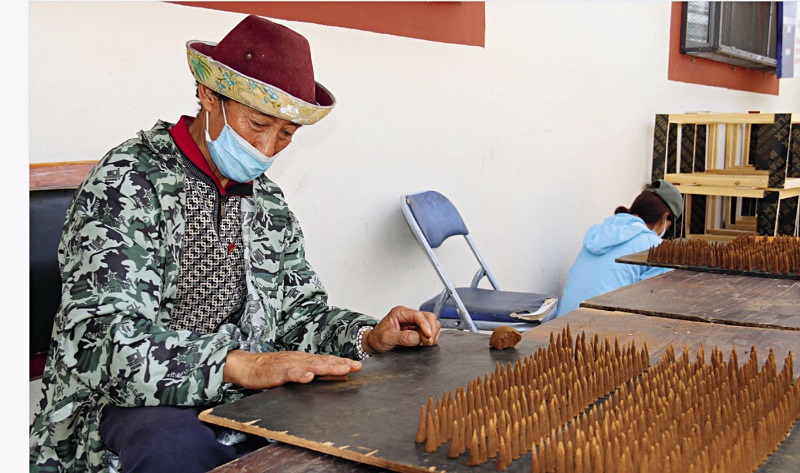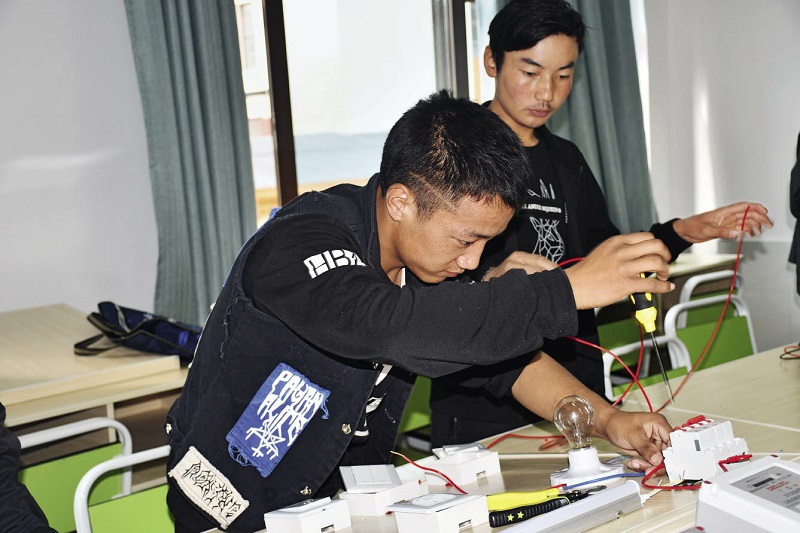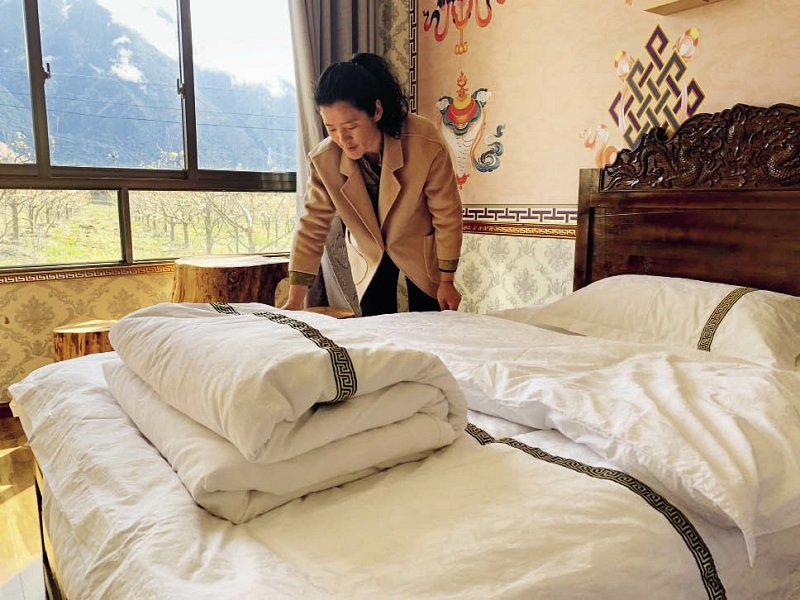
Nyingchi City in southeast Tibet boasts dense forests and picturesque scenery.

A worker in Samdrup’s factory makes incense by hand.
On December 8, 2020, while Nyingchi City was feeling the icy chill of winter, students at a technical school were adding warmth to the ambience as they enjoyed a cooking class. The catering training building was a hive of activity as more than 30 students from various counties and districts in Nyingchi learned how to use various seasoning methods from a culinary master Tsering Yangzom.
Although only 21 years old, Tsering is a passionate guru on Tibetan culinary skills. This is her second stint working as a teacher for the Tibetan breakfast training class in the vocational school. Her easy-to-understand theoretical explanations and skillful cooking demonstrations helped trainees to gain essential knowledge and skills during the month-long course.
Located in southeast Tibet, Nyingchi boasts dense forests and picturesque scenery. However, the beautiful place had been plagued by poverty for decades. At the end of 2015, the city had a poverty-stricken population of 22,803. The poverty incidence rate was 16.42 percent. Most of local farmers and herdsmen had very few skills that could be used in modern employment. For generations, they could only rely on growing highland barley and raising yaks for a living.
In order to change this situation, the city upskilled these villagers and helped them find employment so that they could rise above poverty.

Sonam Tsering and Paljor learning about electric circuits at an electrical appliance repair training course.
New Income Sources
“We tailor-make training programs for farmers and herdsmen, and the purpose is to make sure they master a certain skill,” said Zhu Baijia, principal of Nyingchi Technical School. Instead of complicated or profound theories, teachers focus on easy-to-understand techniques and methods to help arouse students’ enthusiasm about learning.
“Thanks to government support, I got a diploma and landed a job,” said Dechen Wangmo from Guxiang Town, Bomi County, Nyingchi. Wangmo was crippled by polio, and her parents are in poor health. She was recommended to take a domestic service major at the technical school. “I was exempt from tuition fees, and got scholarships and a paid part-time job offered by the school,” she said. Now, the young Tibetan runs a homestay business with the support of the school and local government. “It is skill training that completely changed my life,” she said.
Sonam Tsering hails from Gongbo Gyamda County, Nyingchi. Previously, he spent his days at home unable to find employment. He later registered in a program for electrical applicance repair. He plans to open a repair shop in his county after finishing the program.
Paljor, a classmate of Sonam Tsering, signed up for the program after seeing friends go on an upward career trajectory thanks to skills learned in the school.
Neither Tsering nor Paljor had basic knowledge of the profession, so it was a bit difficult for them at first. Teachers have taken the condition into account. They slowed down the teaching pace, made elaborate explanations, and gave hands-on tutoring to help students like Sonam Tsering master the skill. A pair-up approach was also adopted, asking outstanding students to help those who found the learning a challenging task.
Students at the technical school generally come from low-income families. The school offers them free stationery and helps them with certificate tests and employment.
According to Li Jicheng, director of the Nyingchi Municipal Bureau of Human Resources and Social Security, as of November 2020, the city had found employment for 37,800 farmers and herdsmen, accounting for 49.4 percent of total local labor force, translating to incomes of RMB 430 million. Among them, 9,603 came from families that had recently risen above poverty, an increase of 1,311 over the previous year. On average, each of these workers from poor families had their income increased by more than RMB 11,400.

Dechen Wangmo makes the bed in a guestroom at her family inn.
Technical Training
Tibetan incense is made from a variety of precious Chinese herbal medicines. They were mostly used for religious rituals in ancient times. In modern days, the time-honored specialty in Tibet has been widely received as people believe it can purify the air and help prevent various diseases. Amid the fight against poverty, local people tapped into the potential of the Tibetan incense market as a way to increase their incomes.
Samdrup, who comes from Jiemai Village at an altitude of 2,900 meters in Nyingchi, is a well-known expert in making Tibetan incense. But the cash-strapped Tibetan woman could only run a cottage business. In 2016, the local government loaned RMB 309,800 to Samdrup and helped her build an incense processing plant. In September 2016, the factory was officially put into operation.
Since her childhood, Samdrup had always dreamed of starting a business of her own. She also had the skills needed to run it. After the factory began operating, she turned her focus to securing sales channels. With strenuous efforts, she reached sales cooperation agreements with nine handicraft shops in Lhasa and other areas in Tibet. She also registered vending outlets on e-commerce platforms.
To produce products that cater to the preferences of various customers, Samdrup asked more than 30 tourists from various places for their opinions and suggestions on the aroma, shape, and packaging of incense she made. She went to local Tibetan incense markets to conduct market research, and continuously improved her Tibetan incense formula. Thanks to the efforts, she earned RMB 60,000 in just four months in 2016.
There were another six poor households in her village. They have shaken off poverty thanks to participation in Samdrup’s incense making business. Since 2017, the six households have been receiving business dividends amounting to RMB 3,100 every year. Besides, they can also earn a monthly salary of RMB 3,000 by working in Samdrup’s factory. The business enabled local residents to find a job at their doorway and secure a stable source of income.
Nyingchi has been supporting able people like Samdrup in leading the fight against poverty and the endeavor to realize well-off lives. In addition, the construction project of the Sichuan-Tibet Railway has also created many job opportunities for local farmers and herdsmen. By the end of November 2020, a total of 12,282 farmers and herdsmen had been working for the project, earning RMB 100 billion in labor compensation.
After years of hard work, in 2019, the city achieved a regional GDP of RMB 17.25 billion; the per capita disposable income of urban residents was RMB 33,041, an increase of 11.3 percent; and the per capita disposable income of rural residents was RMB 16,710, an increase of 12.8 percent. All 490 impoverished villages were lifted out of poverty. Absolute poverty was completely eliminated, and people’s sense of benefit was continuously enhanced.

Nyingchi City in southeast Tibet boasts dense forests and picturesque scenery.
ZHANG MENG is a reporter at Tibet Daily.